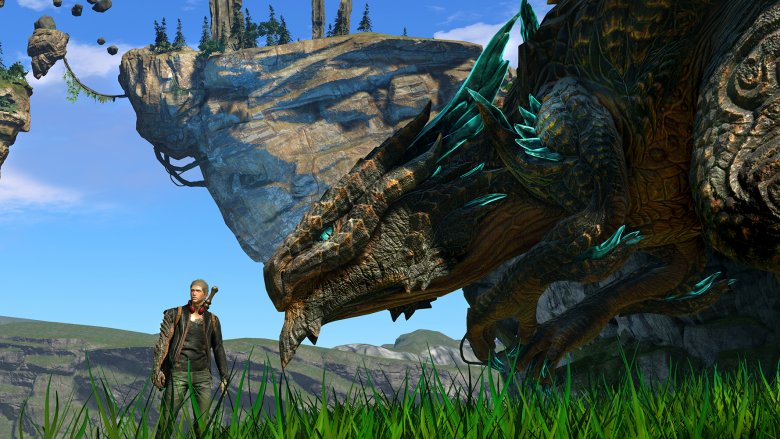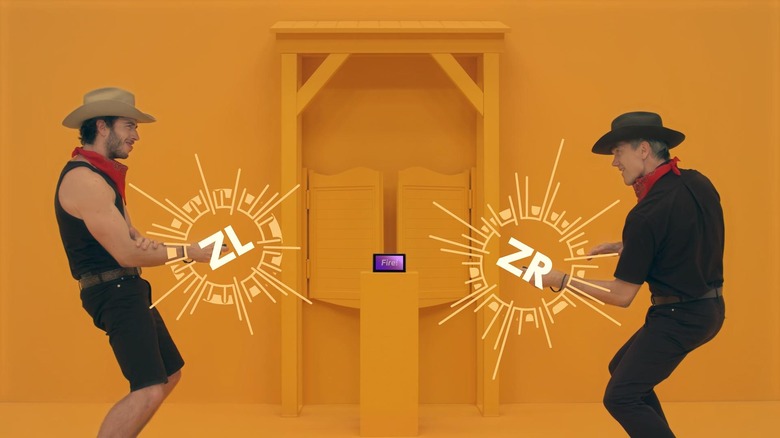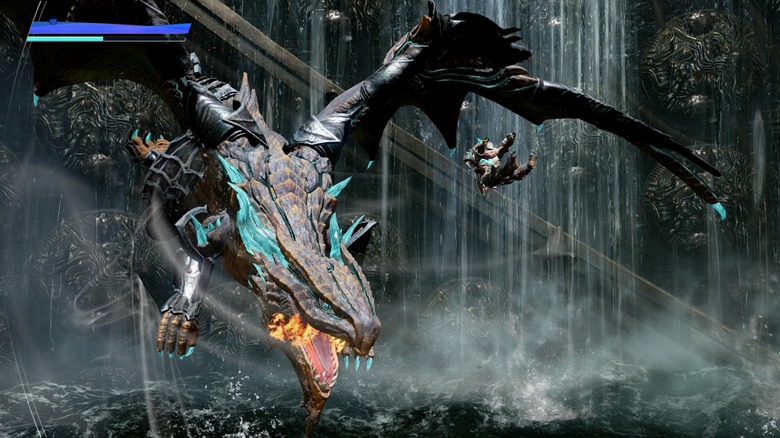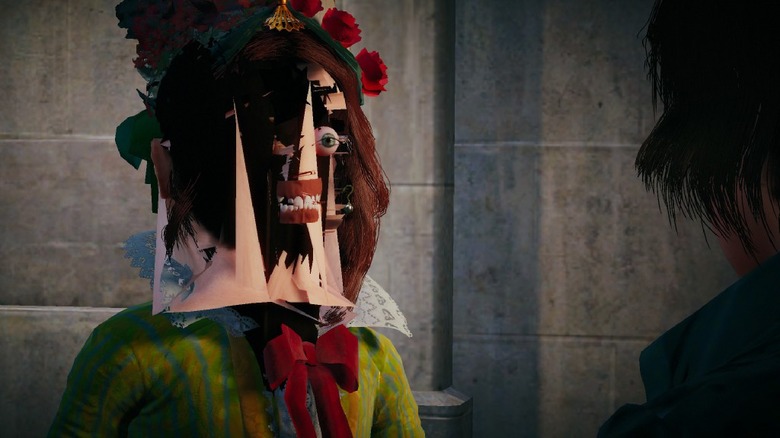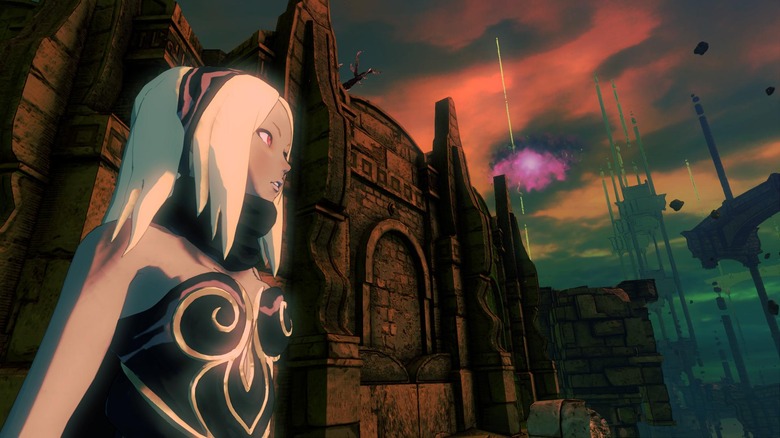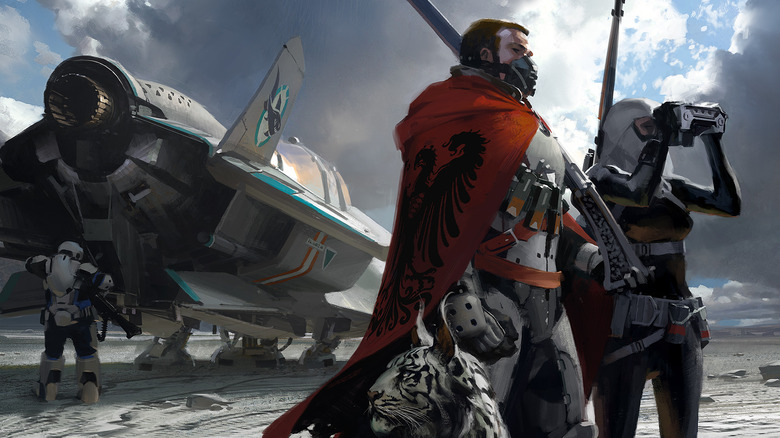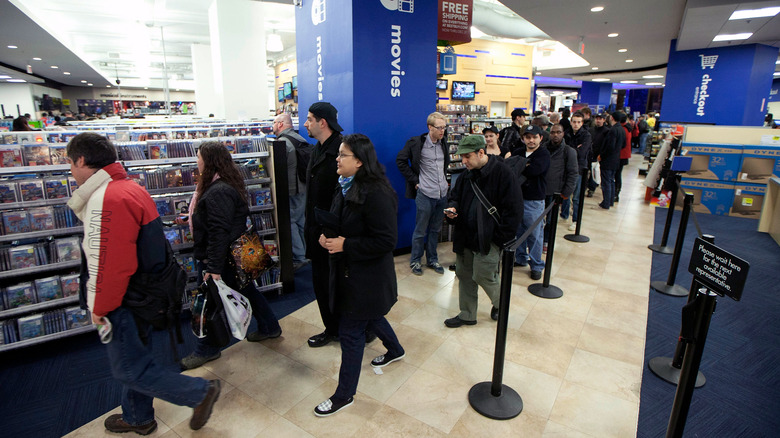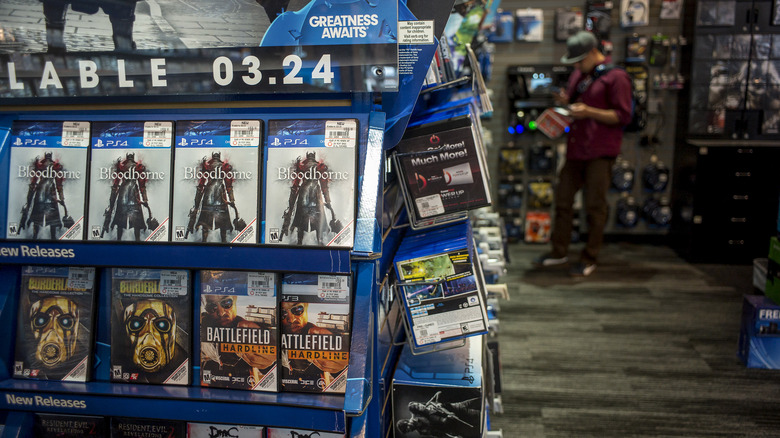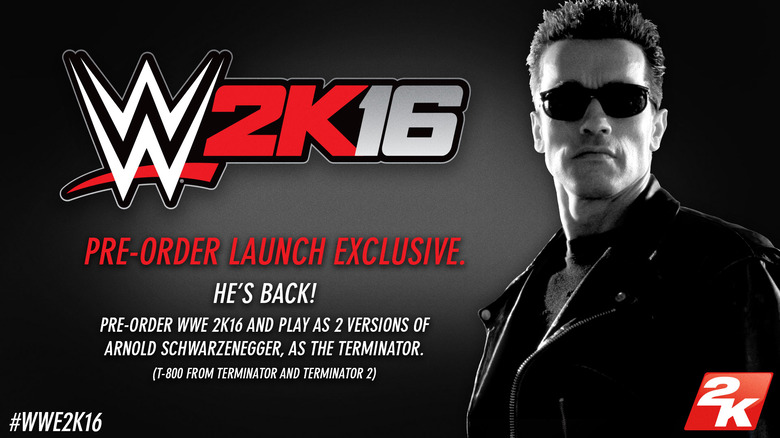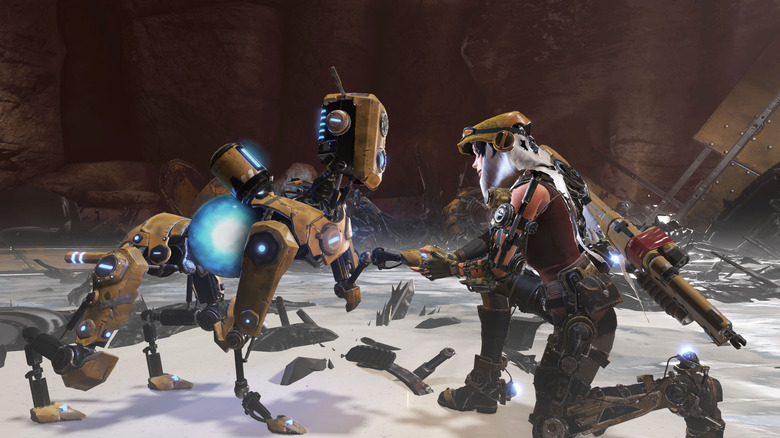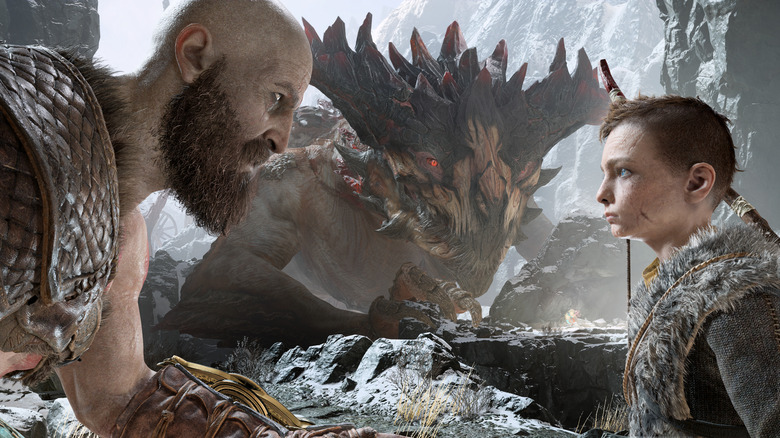Reasons You Should Never Preorder A Game
Once upon a time, the ability to preorder a game was a godsend. Digital downloads weren't a thing on older consoles, which means if you wanted a game, you had to go to a store and buy it. But even that wasn't a surefire way to get a new release. If a title was in demand, there was always a chance a retailer or game store could run out of stock.
Enter the preorder: a promise that, if you put a little bit of money down ahead of time, a copy of the game would be set aside for you at launch.
It made sense at one point, but these days, a preorder is totally unnecessary for a number of different reasons. Digital storefronts mean you don't even need to leave the house to purchase a new game, and retail stores will more likely have a copy available than not. So the system today isn't so much preorder as it is ploy: a way to get your money early by bribing you with digital goodies, or by playing on your fear of missing out. It's gross, and you don't have to take it.
We've put together an entire list of reasons why you should never preorder the games you buy. Read it, soak it all in, and revel in the newfound power you have as a gamer and as a consumer.
It's your money. Start making them work for it.
The game could suck
Game reviews exist for a reason: they're to help you make informed decisions on which games you buy and which you don't. When you preorder, you're essentially placing a bet that a game will be worth your hard-earned cash, reviews be damned. Sometimes it works out. Sometimes it doesn't.
Take 1-2 Switch, for example. If you excitedly put down some money to hold a copy of this game after you preordered your Nintendo Switch, you probably envisioned yourself having Joy-Con shootouts at parties. What you ultimately got was a super underwhelming game that costs $50 — just $10 less than the enormous Legend of Zelda: Breath of the Wild. Fifty dollars to have pretend Western standoffs and hear virtual ice clinking around in a make believe glass. For most people, that's not a great use of their money.
A review could have let you know that, for 50 bucks, 1-2 Switch sucked. Instead, you'll forever tote the cartridge around to social gatherings in hopes that someone will help you milk an invisible cow.
The game could be delayed or canceled
Retailers are notorious for putting up preorders for games that are so far out, no one knows anything about them. Amazingly, some gamers preorder them anyway, even though there's no solid proof the game will make it to the finish line on time — or at all. Preorders long existed for The Last Guardian, a PlayStation 3 title that was delayed so frequently it actually became a PlayStation 4 game. And Scalebound fits the bill of a game that, despite being shown at several big industry events, never fully explained what it was trying to do. Its schizophrenic showings were probably due to the development trouble that lurked behind the scenes, and in early 2017, it was shelved.
If you had preordered either of these titles, you essentially gave a retailer your money to hold for a while. With Scalebound, at least, you got it back. With The Last Guardian, you got a game that had seven years to build itself up to unrealistic expectations.
There could be major bugs at launch
Bugs aren't uncommon in video games, but there are some cases where a glitch is so bad you wonder how it got by the test team. Assassin's Creed: Unity is a famous example of a game that launched with numerous issues — the most famous being a texture bug that turned in-game characters into terrifying nightmare creatures. And who could forget Halo: The Master Chief Collection? That title released with a massively broken online multiplayer system that, years later, 343 is still issuing fixes for.
Hanging back to catch some post-launch impressions would have done you some good. You would have been alerted you to the problems in these games, and you could have waited a few weeks to eventually pick something up that functioned properly. If you preordered, though, you either found yourself among the grotesquely modeled people of Paris in Unity, or not doing much of anything in Master Chief Collection. All because of some bugs you could have easily avoided with patience.
If the game doesn't sell well, it could quickly lose online support
We've come a long way from the first online multiplayer games. Today's titles often make use of the internet to expand upon gameplay in new ways, giving us a window into the adventures experienced by other players. There's just one problem: these features rely on healthy online communities. If the support isn't there for a game, its online modes can suffer as a result, and the company running the servers may find it's simply easier (and less expensive) to shut the servers down than keep things running.
That's exactly what happened with Sony's Gravity Rush 2, which featured a number of online features that enabled players to connect with one another. GR2 was a flop in terms of sales, and rather than support an unprofitable number of players, Sony simply gave up and announced it was pulling the plug.
If you preordered Gravity Rush 2, you never got a chance to see how well it was supported before you made a decision. Instead, you handed over your hard-earned dough for a game that eventually became less than it was supposed to be.
The game's direction could shift between the time you preorder and the release date
You might remember the first gameplay footage of Destiny at E3. The game claimed to contain a vast, unexplored world. The developers boasted that players could visit a mountain in the distance. And look at the above photo. Is that a tiger? In what version of Destiny did I get a cool pet tiger?
Not the one that ultimately shipped. Destiny exists in a long line of games that were a bit too ambitious, biting off more than they could chew before eventually settling on a smaller meal. The Destiny we got didn't let players explore without boundaries. There were death barriers. Small carved out regions instead of large swaths of playable space. And again, no freaking tigers.
Games can change dramatically from the time they're unveiled to the time they're released. If you preordered based on an early vision of Destiny, you found out the hard way that the final product didn't live up to its promise. By waiting until the game's release, you would have learned everything you needed to know about what Destiny actually became.
Preordering might not guarantee you a copy anyway
When you preorder a game, you're supposed to get a copy. Point blank, hands down, period, end of story. That's the entire point of the practice: you're committing some of your money in advance to ensure you get a copy of whatever's coming out, when it comes out. But that's not what always happens, which leads to the question: what's the point?
Best Buy has come under fire in the past for flubbing its preorder process, leading to situations where gamers don't get their game on launch day. GameStop has certainly had issues with accidentally selling all of its preorder copies to walk-in customers, defeating the entire purpose of a preorder. And Amazon has messed up on preorders for both hardware and software, sometimes being forced to delay preorders until more stock comes in. Which, again, isn't what's supposed to happen with a preorder.
Your best bet is to either walk into a store on the day of release to see if you can get a physical copy, or just purchase it digitally. The latter means you can purchase the game, install it, and start playing without ever having to change out of your bathrobe. And really, isn't that the dream?
You're paying the most money possible for the game
Unless a game becomes a rare, out-of-print collector's item, it'll never be more expensive than it is on or before release. Preordering essentially locks you into the games full MSRP, which for many titles is $60. That's likely a few hours of work at your job poured into a single game, simply so you can obtain it at launch and play it while it's part of the zeitgeist.
Here's a secret: waiting to buy a game, even if it's just a few months, could save you a nice chunk of change.
Games tend to drop in price the longer they've been on the market. It's not that the game has become less fun to play — rather, the interest in it has simply diminished over time. The game's perceived value drops, and retailers are desperate to sell copies and clear the way for newer titles. If you can withstand the temptation to preorder, you can walk into a store at a later date and pick that same game up for half off. And that's a far easier price to swallow.
It's an endorsement of preorder exclusive content
A ridiculous practice has emerged in video games, and it has to do with game content. More specifically, content that is developed alongside the stuff you'll find in the main game, set aside for those who preorder a title prior to its release. You'll find it in almost every new game that comes out, and in some cases, you'll even find preorder exclusive content that differs depending on where you preorder the game. How nuts is that?
By preordering a game with this kind of content, you're basically casting your ballot in favor of it. Game companies answer to the almighty dollar, and when gamers vote with their wallets, the message tends to be heard loud and clear. So if you don't want to see more content held back exclusively for preorder copies — like the Terminator DLC for WWE 2K16 — don't preorder the game. Let companies earn your money by putting out great work. Not by enticing you with extras you can't get anywhere else.
It encourages companies to put out unfinished games
You know the old saying, "Put up or shut up?" It can be easily applied to video games and the marketing pushes behind them. It's not unreasonable to be excited about an upcoming title, but when you preorder, you're giving your money away without knowing what you're getting in return. You could get a great game. You could get a terrible game. And in some cases, you could get a game that is clearly not finished. If you preordered ReCore, you got an unfinished game.
Those who jumped into ReCore noticed right away that the T8NK bot advertised in marketing materials was nowhere to be found. And all around the game's world, you could see areas that were meant to be explored using that bot but couldn't be accessed. It took Armature an entire year to release a Definitive Edition of ReCore that included all of its parts, and by that point, the game was both hugely discounted and available in Microsoft's Game Pass for free.
Make game companies prove that what they have is worth buying. When you preorder, you lose that leverage.
You're really not missing out
Gamers experience constant FOMO — fear of missing out — when it comes to the games they play. They're afraid that, if they don't ride the hype train along with everyone else, they'll miss out on something great. They worry that, if they don't get in on the ground floor of No Man's Sky, everyone else will progress and leave them behind. They want to play the big titles their friends are playing so they can be part of the conversation. So they don't have to leave the room or turn off a podcast to avoid spoilers. So they can discover new things and share reactions along with the rest of the community. And so they preorder.
Here's the truth about video games, though. No one has time to play everything. And great games rarely stop being great. You can still play the original Mass Effect trilogy and have the same amount of fun you would've had years ago. The Last of Us is no less stirring than it was when it first arrived on the PlayStation 3 in 2012. Even the widely praised God of War reboot is every bit as good as it was at launch.
If you buy any of the above-mentioned games now, you can be certain you're getting something impressive. And you won't be alone in your playthroughs, because new people are playing them all the time. You're really not missing out if you skip the preorder. You're just being smart.

